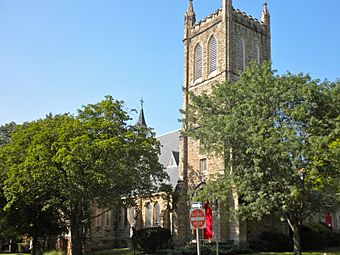St. John's Episcopal Church (Keokuk, Iowa) facts for kids
Quick facts for kids |
|
|
St. John’s Episcopal Church
and Parish Hall |
|
 |
|
| Location | 4th and Concert Streets Keokuk, Iowa |
|---|---|
| Area | less than one acre |
| Built | 1884-1888 |
| Architect | Appleton & Stephenson |
| Architectural style | Gothic Revival |
| NRHP reference No. | 89000806 |
| Added to NRHP | July 11, 1989 |
St. John's Episcopal Church is a historic church located in Keokuk, Iowa. It is part of the Episcopal Diocese of Iowa. The church building and its parish hall were added to the National Register of Historic Places in 1989. This means they are recognized as important historical sites in the United States.
Contents
The Church's Early Days
The idea for St. John's Church started on April 20, 1850. This was thanks to Bishop Jackson Kemper, who was a missionary bishop for the Northwest region. The first leader of the church, called a rector, was Reverend Otis Hackett. He served from 1850 to 1853.
Building the First Church
Under Reverend Hackett's guidance, the first church building was constructed in 1851. It was made of wood. The land for the church was a gift from Josiah Spalding, who lived in St. Louis. Before the church was finished, services were held in the homes of church members.
Founding the Diocese of Iowa
St. John's was one of five churches that helped create the Episcopal Diocese of Iowa in 1853. The church also started five smaller Episcopal missions in and around Keokuk. These included St. Barnabas in Montrose, Iowa and St. Mary the Virgin in Keokuk. St. Mary the Virgin was the first Black Episcopal Church in Iowa. None of these missions are still active today.
Church Members in the Civil War
During the American Civil War, many members of St. John's Church joined the Union Army. Some of these members became high-ranking officers. They included Generals Samuel Ryan Curtis, Hugh Thompson Reid, James C. Parrott, and William W. Belknap. Belknap later became the Secretary of War for President Ulysses S. Grant. Other members who served were Colonels William H. Worthington and John A. McDowell. Keokuk was known for having many high-ranking officers, and St. John's Church had many generals and regimental commanders among its members.
Designing and Building the Current Church
The beautiful church building you see today was designed by architects Appleton & Stephenson from Boston. It was built by F. W. Menke from Quincy, Illinois. Reverend Robert C. McIlwain was the church's rector when construction began on June 5, 1884.
First Services and Consecration
The first church services in the new building were held on February 12, 1888. The church was officially dedicated, or "consecrated," on January 4, 1891, by Bishop William Stevens Perry.
The Parish Hall and Rectory
The parish hall, which is a building used for church offices, education, and social events, was built in 1895. It was designed by the same architects and built by the same contractor as the church. The rectory, which is the home for the church's rector, was finished in 1913. Reverend John C. Sage, who later became a bishop, oversaw its completion.
Church Architecture and Features
The church building combines two architectural styles: Gothic Revival and Richardsonian Romanesque. It is 118 feet (about 36 meters) long and 48 feet (about 15 meters) high. The main part of the church, called the nave, is 54 feet (about 16 meters) wide. The transept, which is the part that crosses the nave, measures 82 feet (about 25 meters) in total width.
Bell Tower and Materials
The bell tower, located at a corner of the church, stands 75 feet (about 23 meters) tall. It holds the original bell from the first church building. Both the church and the parish hall are built from Bedford limestone and have roofs made of slate.
Inside the Church
The inside of the church features many hand-carved items created by William Bartels of Carthage, Illinois. He carved the reredos (a screen behind the altar), the altar, the altar rail, the chancel screen, and the ends of the pews. The front of the altar has three panels showing grapes and wheat, which represent the Eucharist, and a carving of Christ carrying the cross. The only item from the original church still inside is the baptismal font, which was carved from limestone by William Bawden.
Stained Glass Windows
The church has more than forty beautiful stained glass windows. Most of these were put in when the church was built, but others were added over the years. The newest window was installed in the 1970s. Seven different companies made these windows, including Franz Mayer & Co. from Munich, Germany, Tiffany Studios from New York City, and J. Wippell & Company from Exeter, England.
The Pipe Organ
The church's pipe organ was built in 1965 by the Temple Organ Company of Lamoni, Iowa. It has 22 registers, 27 ranks, and 1,520 pipes, which means it can make a wide variety of sounds. There is also a smaller processional organ at the back of the nave.
 | John T. Biggers |
 | Thomas Blackshear |
 | Mark Bradford |
 | Beverly Buchanan |



